EXCLUSIVE: Houthi Red Sea Crisis. Middle East Tensions Deepen.
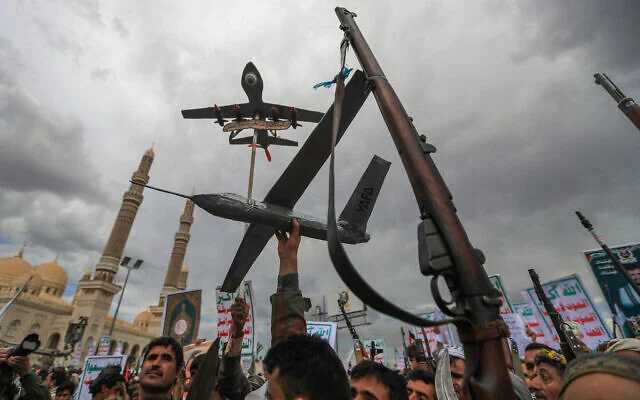
The Houthi movement in Yemen has reignited the Red Sea crisis by announcing a naval blockade of Israel’s port city of Haifa, a move that deepens regional geopolitical tensions and raises the risk of a broader Middle East conflict involving Iran, Israel, and international actors.
The blockade, declared in May, marks a strategic shift in Houthi operations. Unlike previous threats targeting vessels in the Bab al-Mandab Strait, the new campaign employs long-range drones and ballistic missiles to threaten maritime traffic as far as the eastern Mediterranean. The group’s leaders claim the action is a response to Israel’s continued military operations in Gaza and southern Lebanon, and they have vowed to continue disrupting shipping until those campaigns cease.
Yahya Saree, spokesperson for the Houthis, framed the blockade as a moral imperative.
“We are acting in solidarity with the oppressed people of Palestine,” he said.
The group has received strong rhetorical and logistical backing from Iran, suggesting a high level of coordination with Tehran at a time when Iranian-Israeli hostilities are escalating.
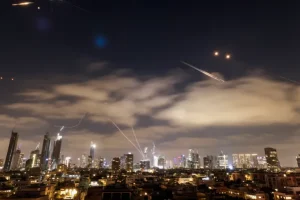
Analysts view the blockade not only as a tool of asymmetric warfare but also as a strategic political message.
“The Houthis are seeking to assert themselves as a major regional actor by inserting themselves into the Israel-Iran conflict,” said Imad Harb, Director of Research and Analysis at the Arab Center Washington DC. “This is not just about Gaza. It’s about realigning regional power.”
The US and several European countries have condemned the blockade. While Washington recently concluded a ceasefire deal with the Houthis over Red Sea shipping threats earlier this year, the new attacks on Israeli-linked ships suggest that the truce may be limited in scope and effectiveness. US officials have said they are monitoring the situation but have not indicated whether they would intervene militarily to ensure freedom of navigation in the eastern Mediterranean.
In response to the blockade and ongoing Houthi missile launches, Israel has conducted airstrikes on targets in Yemen, particularly in the Hodeidah port area. The Israeli government has warned that further aggression will be met with expanded military action.
“We will not tolerate terrorist attacks on our shipping or our sovereignty,” said Israeli Defense Minister Yoav Gallant.
While Israeli officials maintain that their strikes are precise and targeted, Houthi sources have reported civilian casualties and infrastructure damage, further stoking anti-Israel sentiment in Yemen and beyond.
The Haifa port blockade has alarmed shipping companies and energy markets. Though Haifa is not a Red Sea port, the Houthi ability to strike vessels far from Yemen has rattled commercial operators and drawn attention to the group’s increasing missile and drone capabilities—many believed to be supplied or enhanced by Iranian technology.
The United Nations and several regional actors, including Egypt and Oman, have called for restraint. UN Secretary-General António Guterres emphasized the importance of de-escalating tensions in the Red Sea and Mediterranean to protect global trade routes and avoid humanitarian fallout.
The Houthis’ assertive stance is part of a broader realignment in the Middle East as non-state actors take on expanded geopolitical roles. Their involvement adds complexity to the already volatile Israel-Iran standoff, as well as to US efforts to contain conflict in the region while maintaining the stability of vital maritime trade.
With ballistic missiles now reaching deeper into Israeli territory and Iranian forces openly engaging with Israel, regional observers worry the situation could spiral.
“We are witnessing the gradual breakdown of traditional deterrents in the region,” said Dr. Roby Barrett, a Gulf security analyst. “The Houthis are no longer just a Yemeni insurgent group; they’re becoming a regional actor with strategic depth.”

To gain a better understanding of the political side of the Houthi blockade, Wyoming Star spoke with Dr. Ian Ralby, a maritime security expert and CEO of I.R. Consilium.
Wyoming Star: How would you assess the legality of the Houthi blockade under international maritime law? Does it constitute an unlawful interference with freedom of navigation?
Ian Ralby: Let’s start with the fact that this is not by law a blockade. The law of blockade is restricted to the lex specialis of the law of naval warfare. In other words, it’s a specific construct under law that requires certain elements that cannot be met by the Houthis because they are not a state and not a warring party in a normal sense. This is an unlawful effort to diminish freedom of navigation through the Red Sea and the Northwest Indian Ocean. But this has nothing to do with “blockade” as a word. Colloquially, yes, they are blocking some of the traffic, but they are blocking it by illegally attacking merchant vessels. It is obviously a phenomenon of terrorism where they are criminally interfering with the movement of vessels. But the Houthis are not a state construct and thus not technically a blockade. Certainly, it’s unlawful to use violence against a ship engaged in navigation, it’s unlawful to kill people, and it’s unlawful to destroy the marine environment. There are so many laws that are violated. And obviously just the use of some of these weapons is regulated under international law and treaties. This is a very unusual situation because we have a non-state actor whose primary focus in terms of its execution of violence, which is normally restricted to a state’s purview (states have the monopoly on violence), is a non-state actor using extreme violence directed not towards another state or government or any kind of traditional adversary but towards maritime commerce itself.
It’s an unusual situation, but it’s not a blockade legally. It doesn’t trigger the lex specialis of naval warfare.
Wyoming Star: What distinguishes this current phase of the Red Sea crisis from earlier maritime disruptions in the region?
Ian Ralby: It’s distinct not only from other disruptions in the region but anywhere else in the world. We’ve had other key maritime disruptions. Iran has been a particularly acute user of what we call maritime hybrid aggression, where a state with conventional forces chooses a somewhat unconventional action and does so with a degree of plausible deniability but always violates the law in the process and can scale up or down that action depending on the response—that is maritime hybrid aggression. The key emphasis there is that it’s a state with a conventional force choosing unconventional action. The Houthis cannot engage in hybrid aggression because they are a non-state actor. However, the Iranian approach to using hybrid aggression in maritime space in recent years, going back to 2019 and until now, has largely been targeted. In other words, there are very clear messages to very clear interlocutors sent by the attacks that they have perpetrated. Generally, they have not thought to kill people, and while some did die on Mercer Street in July 2021, the majority of their attacks have been used to send messages. The Houthis, by contrast, are merchants of chaos and have no problem with either killing people or sinking ships. The other thing the Iranians tried not to do is cause a catastrophic spill, and this is again something that the Houthis have not been all that concerned about, as indicated by the Rubymar sitting at the Bab el-Mandeb Strait with 22,000 tons of ammonium phosphate sulfate on board. So this is a very different mentality from the outset. In terms of the broader implications, we’ve had piracy surges in the Northwest Indian Ocean, the Strait of Malacca, and the Gulf of Guinea, and often those are certainly disruptive to maritime commerce but do not completely inhibit it. War risk premiums are paid, additional countermeasures are taken, best management practices are implemented, and efforts are usually made to quell whatever uptake there is in violence against ships, but where those have been different is that the piracy incidents are all focused on profit, and they are looking at money.
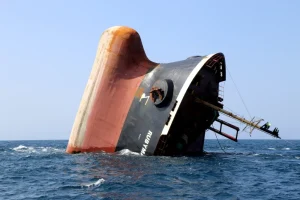
The Houthis are not fundamentally looking at attacking ships in order to gain money. They are looking at attacking ships in order to advance an ideological cause of their theological movement, which is grounded in an imperial mindset, that they will control the world headquartered in Jerusalem with control of Mecca and Medina.
They are a very singular group. They are different from other actors, and so this disruption is distinctive both because it’s a non-state group and because it’s a non-state group that isn’t interested in money primarily, so it’s closer aligned to a terrorist organization, but it’s obviously different from normal terrorist organizations because they are so well equipped and motivated to continue attacking no matter what intervention comes from the US, the UK, the EU, Israel, or anyone else.
Wyoming Star: How has the nature of Houthi maritime operations evolved since the beginning of the Red Sea crisis? What new capabilities—technological or otherwise—have you observed Houthis utilize?
Ian Ralby: The Houthis have one main speed, and it’s to escalate, but they escalate in waves because they put on a show of de-escalation in order to regroup before a new escalation. The Houthis have gone through a lot of different things. Initially, what we saw on the outses with the abduction of the Galaxy Leader in November 2023 was a one-off. It was the only vessel that they’ve abducted, and they did it in such spectacular fashion—filming it, landing on it, and then turning it into a museum and event venue where they can charge people for the opportunity to explore the vessel, see the crew held hostage, and even have weddings and other things on it. It’s a pretty unique form. Normally when people abduct vessels, they are looking to hold them for ransom, and so this is a very different approach than piracy incidents in other parts of the world. It could be considered a singular incident of piracy where you have depraved acts of violence and deprivation against a vessel on the high seas, in this case in the international strait between one vessel or aircraft and another vessel or aircraft, with the goal of private ends. Now the question part is the private ends part. There’s usually a very clear private end, which is profit. In this case that is different. Was this a private end? It’s hard to tell. That is the one incident of either piracy or abduction of vessels that we saw. We then saw a variety of different types of escalations—aerial attacks on vessels with drones and missiles, surface attacks both manned and unmanned, and unmanned underwater attacks. All of this has had within it additional phases of escalation. In the aerial attacks, we’ve seen an improvement and increase in the lethality of the drones being used. We’ve seen an increase in the intensity and long range of the weapons being used to the point of actually testing out hypersonic missiles, which is not something we’ve expected for a non-state actor to possess, much less use in the maritime space. Then we have additional phases—a 5th one being information operations, where the Houthis have really engaged in some pretty creative fraud, branding their operation center as a humanitarian operation coordination center and claiming to be the Yemeni navy, where they’ve engaged in all kinds of currency and diplomatic fraud—all sorts of different layers to make it seem like they are the legitimate government of Yemen when they are not and to lure ships even at times into the exact positions they want them to be hit. The True Confidence, for example, was inbound for the Bab el-Mandeb, coming through the Gulf of Aden, when the Houthis hailed it on the radio and said, “This is the humanitarian operation coordination center of the Yemen navy. We’ve been looking out for you. You are being targeted by the Houthis, so we advise you to turn around and go southeast.” They did, and that was the Houthis lining them up to hit them, and unfortunately several crew members died in that incident. So the information operations have been extremely successful against both mariners and in terms of wooing the population to support them. The region sees them as very successful in having conducted a protest of Israel-Gaza. The fact is they don’t care about Israel-Gaza, not really. The Palestinians are cannon fodder in their minds as well. Look how many people have killed themselves. At this point they are still responsible for more Arab deaths in the region than Israel. They have a huge amount of blood on their hands. They take very aggressive and cruel tactics to an extreme. If they are caring about the lives of Palestinian children, why are they literally killing children by sniper fire in the streets of Taizz to soften the town in order to take it? They are extremely hypocritical, but their information operation has successfully made it look like they care about the Palestinian cause.
In addition to the abduction of vessels, the aerial attacks, the surface attacks, unmanned underwater attacks, and the information operation, we’ve seen longer-range attacks, including against Israel itself, and the terrestrial attacks in Tel Aviv and elsewhere, most recently against the Ben Gurion Airport.
And the last phase of escalation has been to form alliances, new relationships with groups in the region, including the Islamic Resistance of Iraq, Hezbollah, some other Iranian proxies, some of the other terrorist groups such as al-Shabaab in Somalia, and, most importantly, the Chinese and the Russians. They now have very close relations with the Russians, and in fact, the Russian element may actually eclipse that of the Iranian element in Sanaa in terms of providing support for the Houthi operations. So there are some interesting changes in terms of alliances and closeness of relations. And the Houthi expansion of relations has been a key point of escalation.
Wyoming Star: To what extent do the Houthis possess independent operational capability versus relying on external support, particularly from Iran? Are their current tactics—including remote or asymmetric blockades—sustainable in the long term?
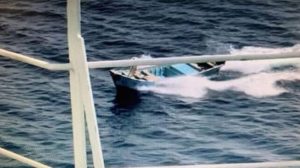
Ian Ralby: The Houthis have long had their own abilities, but they’re more extreme now than ever before. Obviously, for some of the weaponry and technology, they do rely on others. They are, however, developing their own. And what they have learned is that to attack shipping and be successful in sinking a vessel requires much lower technology than perhaps most think. For example, shooting long-range ballistic missiles at ships is pretty tough. If you want to actually hit a vessel and sink it, that’s very tough. But slamming an unmanned remote-control bomb boat into the hull of a commercial vessel is pretty easy in comparison and more likely to sink it. So unfortunately the Houthis and those who are watching the Houthis have learned an important lesson, which is that lower, cheaper technology can be very effective in causing incredible disruption, even more so than some of the longer-range weaponry that garners more public and international attention. Additionally, they’ve learned another critical lesson that others are learning: $5,000 drones are extremely cheap and easy to produce, and if you can manufacture them and set them out in large enough numbers on a frequent enough basis, you can effectively burn huge amounts of response capacity in traditional militaries.
When you are forcing a military like the US, the UK, or the Europeans to use $5 million countermeasures to shoot down $5,000 drones, the math adds up very quickly to being in the favor of those who are using the cheaper technology.
And that is a worrying sustainability point where, oddly, the long-term sustainability of the lower- and higher-impact work of the Houthis is quite possible. And the Houthis are likely, unless they are stopped on land, which is what they care about, to continue to pose a threat to maritime operations indefinitely.
Wyoming Star: What immediate and longer-term impacts is this blockade having on Israel, both economically and militarily?
Ian Ralby: Well, Israel’s not the main affected party. In fact, it’s not really about Israel.
The main impact is much more on some of the other Arab states. Egypt is probably the most affected by it.
So it is again ironic that the choice is to protest through firing missiles and drones at innocent seafarers. Not only is it hypocritical in the sense of its origin, but it’s also hypocritical in the sense of its impact. It really hasn’t made a huge degree of difference. Most of the shipping industry, the legitimate industry, has managed to find alternative routes, and we’ve essentially entered a new normal in terms of rounding the Cape of Good Hope. But Egypt has suffered catastrophic economic harm. The Suez Canal used to bring in about $9.5 billion in direct revenue and about $56 billion in economic impact on Egypt’s economy. That’s a major portion of its GDP, and something that having lost two-thirds of it is being felt. And it has put Egypt, which is also experiencing the challenge of an increased population from various refugee situations, not just the Palestinians but also Sudanese and others, in a critical economic position where their collapse could spell a disaster for much of the region. Additionally, other states in the region—Saudi Arabia, Djibouti, and even up into the Gulf—are feeling it much more. Djibouti has seen a massive downturn in access to vessels. And with that comes a major decrease in the amount of food aid that is available to support countries that are in critical situations like Ethiopia, Eritrea, Sudan, and beyond. So this is more about Arab states suffering than it is about Israel. The Houthis have actually harmed Arabs more than anyone else.
Wyoming Star: European economies, especially those in the Mediterranean, are heavily reliant on the Suez Canal route. How are rerouting and delays affecting supply chains and trade flows into Europe?
Ian Ralby: Obviously they are affecting them significantly. But because there was excess capacity in the container sector in particular, which is the sector most affected by all this, there was an ability to absorb some of the time and challenge of rerouting. There’s, as I said, a new normal that has emerged. Oddly, it hasn’t been as impactful as other things and certainly completely upended the European economy.

It’s a challenge, but it’s a challenge that’s thus far being managed. Can the economy, though, withstand this long term? No. Can it also withstand this in terms of any other shock to the system that could disrupt it further? No. And that’s where there’s a real challenge.
It’s essentially eaten up the margin for error, and that’s the challenge for Europe at this point. It’s a critical need, but it also applies in the other direction. India has seen a massive downturn in the amount of containerized goods that are moving through, and that’s challenging its economy. And with the world’s largest population, it is a critical need to make sure that trade routes don’t completely skip out on one of the world’s largest democracies.
Wyoming Star: Could the crisis catalyze long-term changes in global shipping patterns, such as rerouting away from the Suez Canal and investing in alternative corridors?
Ian Ralby: Yes, absolutely. I think right now that is where things are heading. It’s going to be a long time before the large-scale reuse of the Red Sea is viable either from a security or an insurance standpoint. The war risk premiums are going to remain high for quite a while until there’s certainty. As to the decrease, obviously, with the intense interaction now between Israel and Iran, that only causes more tension. So yes, we are more likely to see a longer-term use of the southern corridor around the Cape of Good Hope. That also brings up the need for greater agility in the global marketplace. We’re likely to see newer ports, smaller ports, potentially market themselves as alternatives and spokes and hubs. So yes, this is probably going to catalyze a degree of change and an emphasis on agility.
We have had an emphasis on narrow margins. The pandemic and now this crisis have both put an emphasis on the shipping industry needing to be much more agile, and it’s doing so pretty well.
But there’s going to be more investment in port infrastructure and other things in order to accommodate changes in those routes and supply chains.
Wyoming Star: Do the Houthis’ actions pose a risk of normalizing non-state actors exerting strategic control over international waterways? Could this be the beginning of a broader trend where maritime chokepoints become battlegrounds for geopolitical influence?
Ian Ralby: This is the biggest concern. Because the Houthis have shown both that there are opportunities for disruption at an enormously large scale that perhaps others hadn’t really recognized, plus it comes with, perhaps, yes, some reprisals and attacks, but on the whole it comes with a huge amount of attention, global relevance, and international significance. With that comes financing and funding from bad actors of all sorts—other terrorist groups, some state actors. And the potential for making money off of the very activity where tributes are paid in order to not be attacked. So the Houthis have potentially set forth a new formula or model for other non-state armed groups around the world. And this is the concern we have to guard against.
Wyoming Star: How would you interpret the recent US–Houthi ceasefire agreement? Is this a blueprint for resolving this crisis, or will some kind of diplomatic/military intervention be necessary?
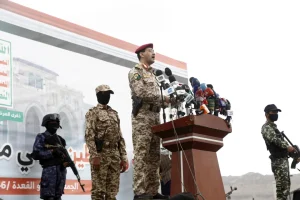
Ian Ralby: It would be laughable and quite naïve to think that this will resolve the situation. The Houthis have an incredible track record of not abiding by any agreement that they have ever signed. In fact, they are predictably unpredictable, and they are predictably untruthful and unfaithful to their own word. So there’s no chance that this will resolve the situation. The Houthis don’t care about agreements, they don’t care about the truth of their statements, and what they care about is territory. They’re an imperial-minded entity, and as they continue to expand, what do they need? They need territory. So the only thing they care about in terms of center of gravity is the control of territory. And until that is threatened, which the ceasefire agreement did not do, they couldn’t care less. The Houthis love to be bombed. They’re an odd group in that regard, because it does bring them relevance and excitement. Because they are born of the false narrative that they’re at war with the West. The more they get bombed, the more their narrative actually holds water, which means that they can recruit, they can fundraise, and they can do all kinds of things to advance that false narrative. The Houthis are not like other groups. They’re not like the Taliban, they’re not like al Qaeda, and they’re not like any bad state actor. They are a singular group, and until they’re absolutely stopped in their approach to having an empire that will be headquartered in Jerusalem and control Mecca and Medina, they’re not going away.
And unfortunately, the ceasefire did more to help the Houthis get a chance to regroup than it did to end the situation. So watch this space because the Houthis are far from done.
Wyoming Star: What role could Oman or other Arab countries in the region play in a longer-term de-escalation or maritime security framework?
Ian Ralby: Well, the other Arab states could play a huge role, but the Houthis have done a remarkable job in positioning Israel as their guarantor of their security. As long as what they are doing is fashioned as a counter to Israel incurring into Gaza, the other Arab states aren’t going to do very much at all. Because anything to stop the Houthis is seen as stopping that protest of Israel. And why would you help Israel by harming the Houthis? So it’s a challenging geopolitical position that the Houthis have masterfully manipulated and that the West hasn’t fully understood. So yes, they could help, but will they? Not as long as that narrative continues.
Wyoming Star: What potential escalation scenarios concern you most with Houthis being an Iranian proxy and current rhetoric surrounding the Iran nuclear deal?
Note: The interview was conducted on June 13 as the information about the major Israel-Iran escalation was coming through. As of June 17, the Houthis have missile strikes on Israeli targets in coordination with Iran.
Ian Ralby: Obviously this question is a little bit eclipsed by last night’s events, and we’re now in the position where the Houthis could be the wild card in this whole regional picture. Things are incredibly tense. Iran has a long history of de-escalating. They escalate very much in their rhetoric, but they de-escalate in their actions after a resurgence in kinetic activity. Israel, however, is not a de-escalatory power. They are not looking to de-escalate. Bibi Netanyahu has indicated no desire to deescalate pretty much on any of the fronts, whether it’s Gaza, the incursions into Lebanon, now Syria, and certainly now with Iran. So if the Houthis are perceived to be acting on behalf of Iran, even though they have gained a degree of independence at this point and have actually eclipsed Iran’s tolerance for chaos, they could actually spoil Iranian efforts at de-escalation and cause a much wider regional conflagration. So this is a very precarious situation.
Wyoming Star: What policy recommendations would you give to Western governments to better prepare for and respond to hybrid maritime threats like this one in the future? What strategies are already being implemented?
Ian Ralby: First of all, this is not a hybrid maritime threat. The Houthis are not a hybrid actor. Hybridity implies a state with a conventional force choosing to use unconventional action. That’s element one. It’s failed in this case with the Houthis. This is not a hybrid threat. It’s an asymmetric threat—it’s a non-state terrorist organization that is causing complete havoc by attacking global maritime commerce, but it’s not a hybrid threat. I think what in this case needs to be looked at is who has the keys to deal with the situation both legally and in terms of operational effectiveness? Who understands them? Who can do something about them, and what can be done to support them? That has never been asked.
We have failed in dealing with the Houthis because we failed Rule 1 of strategy—know your opponent. We haven’t understood them. And we also haven’t understood Rules 2 and 3 of strategy—know ourselves and know our terrain.

The terrain involves the territory of Yemen, which is actually led by an internationally recognized government of Yemen that’s been at war with the Houthis for over a decade now. And the problem is that we have not provided them with the support needed to take back their sovereignty. And in fact, most of the actions by the international community have diminished their efforts to take back their sovereignty. This whole situation with the Houthis attacking shipping would likely not have occurred if, in 2018, during the last Trump administration, the US and the UK hadn’t pushed the government of Yemen to accept the Stockholm Agreement and sort of a détente with the Houthis over the port of Al Hudaydah and let the Houthis have it. We actually have an incredible responsibility in this whole picture, because the international community essentially bullied the internationally recognized government of Yemen to stop the fighting and to allow for the Houthis to control the port of Al Hudaydah. That was a mistake, and that is one for which we are paying the price now. So before we get to policy, we have to spend time getting to understand our opponent, understanding ourselves in terms of what our actual interests are and what our levers are, what we could and couldn’t do, and understanding the terrain. Who can act? What are their interests? What’s going on? We did not do that, and so we’ve made uniformly bad policy for a long time. So in terms of the future, be strategic in understanding the situation before deciding what to do about it, and in this particular case, the key actor that has been left out of the mix is the internationally recognized government of Yemen.
With input from Reuters, Al Jazeera, The Maritime Executive, Arab Center Washington DC, the United Nations, and Euronews.
Learn more about the economic and legal sides of the blockade.
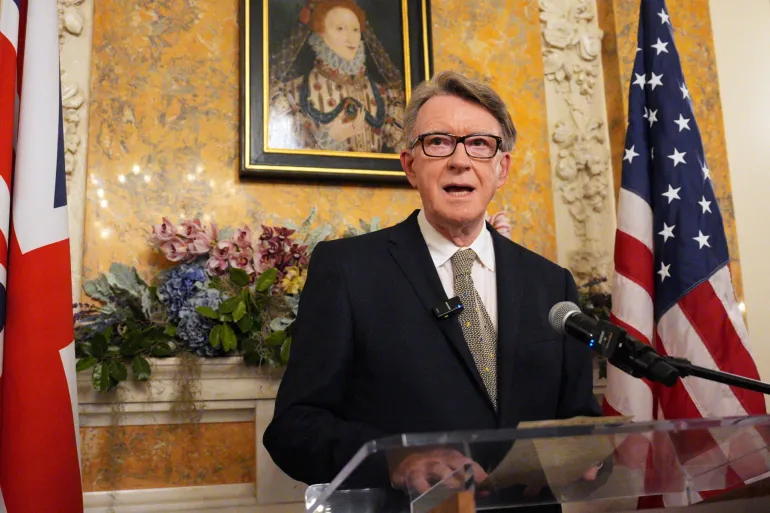








The latest news in your social feeds
Subscribe to our social media platforms to stay tuned